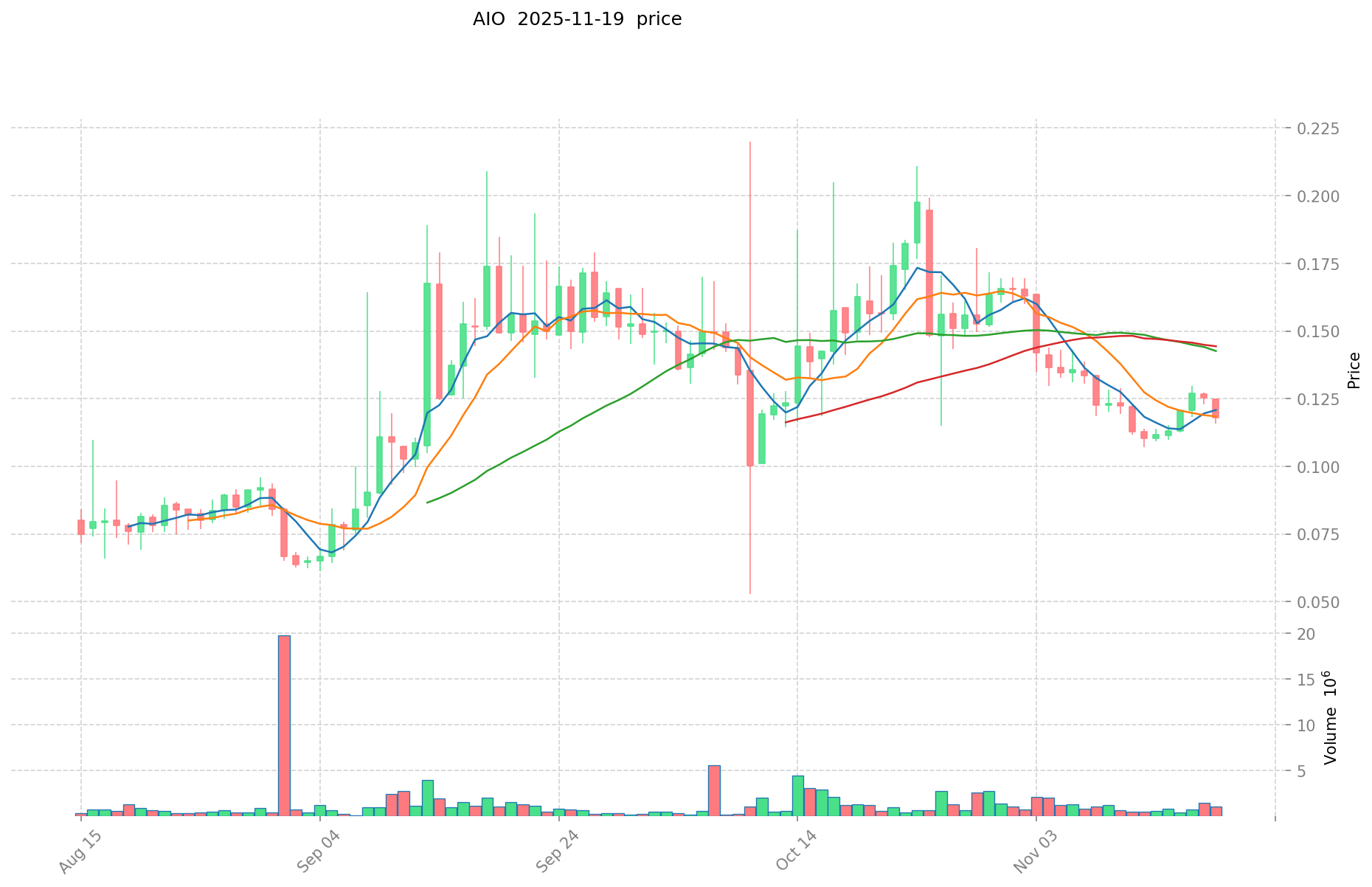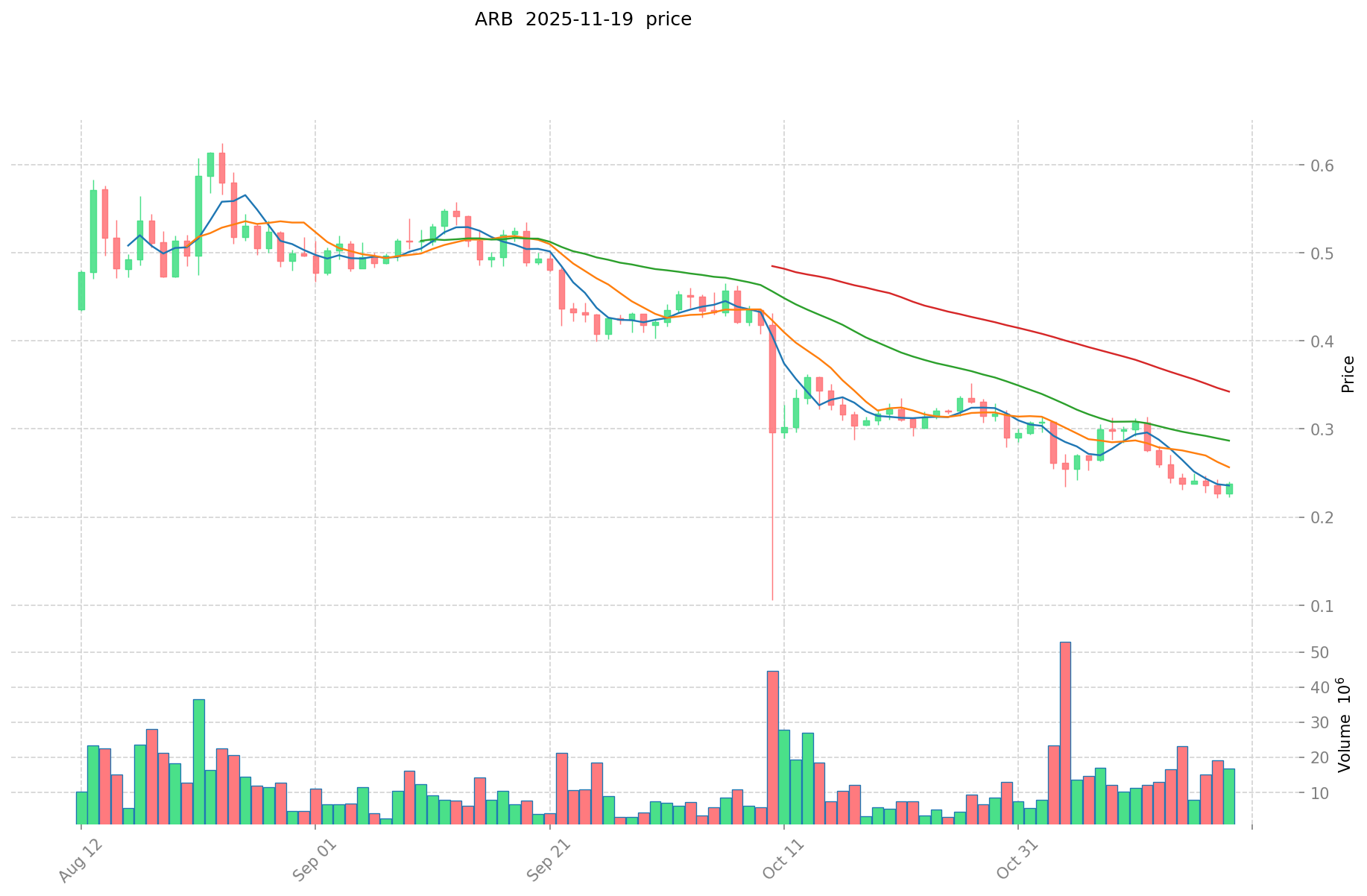AIO vs ARB: The Battle of Investment Strategies in Cryptocurrency Markets
Introduction: AIO vs ARB Investment Comparison
In the cryptocurrency market, the comparison between AIO and ARB has always been a topic that investors can't ignore. The two not only have significant differences in market cap ranking, application scenarios, and price performance, but also represent different positioning in crypto assets.
OlaXBT (AIO): Since its launch, it has gained market recognition for its AI-driven trading insights and strategies.
Arbitrum (ARB): Introduced as an Ethereum scaling solution, it aims to enable high-throughput, low-cost smart contracts while maintaining trustless security.
This article will comprehensively analyze the investment value comparison between AIO and ARB, focusing on historical price trends, supply mechanisms, institutional adoption, technological ecosystems, and future predictions, attempting to answer the question most concerning to investors:
"Which is the better buy right now?"
I. Price History Comparison and Current Market Status
OLAXBT (AIO) and Arbitrum (ARB) Historical Price Trends
- 2025: AIO reached its all-time high of $0.22 and all-time low of $0.05267 on October 10.
- 2023: ARB reached its all-time high of $4.00 on March 23.
- Comparative analysis: In the current market cycle, AIO has shown significant volatility, ranging from $0.05267 to $0.22, while ARB has declined from its all-time high of $4.00 to its current price.
Current Market Situation (2025-11-19)
- AIO current price: $0.11945
- ARB current price: $0.2382
- 24-hour trading volume: AIO $122,400.13625 vs ARB $3,715,181.501371
- Market Sentiment Index (Fear & Greed Index): 15 (Extreme Fear)
Click to view real-time prices:
- View AIO current price Market Price
- View ARB current price Market Price


II. Core Factors Affecting Investment Value of AIO vs ARB
Supply Mechanism Comparison (Tokenomics)
-
AIO: Limited supply with a maximum cap, creating scarcity and potential deflationary value over time
-
ARB: Governance token with a total supply of 10 billion tokens, with controlled distribution to ecosystem participants
-
📌 Historical Pattern: Limited supply cryptocurrencies have historically shown stronger price appreciation during bull markets due to supply constraints meeting increased demand.
Institutional Adoption and Market Applications
- Institutional Holdings: ARB has gained more institutional interest due to its connection to Arbitrum's Layer 2 scaling solution for Ethereum
- Enterprise Adoption: ARB has broader enterprise applications in DeFi protocols and scaling solutions, while AIO is still establishing its market position
- National Policies: Regulatory frameworks for Layer 2 solutions (like ARB) are generally more favorable than newer tokens like AIO
Technical Development and Ecosystem Building
- AIO Technical Upgrades: AI integration for enhanced trading functions and market analysis capabilities
- ARB Technical Development: Continuous improvements to the Arbitrum protocol, enhancing transaction speeds and reducing costs on Ethereum
- Ecosystem Comparison: ARB has a more developed ecosystem with significant DeFi applications and protocol integrations, while AIO is expanding its AI-powered trading platform capabilities
Macroeconomic Factors and Market Cycles
- Performance During Inflation: ARB tends to follow Ethereum's inflation response patterns, while AIO lacks sufficient market history to determine inflation resistance
- Macroeconomic Monetary Policy: Both tokens show sensitivity to interest rate decisions and broader crypto market sentiment
- Geopolitical Factors: Layer 2 solutions like ARB benefit from increased cross-border transaction demand during global uncertainty
III. 2025-2030 Price Prediction: AIO vs ARB
Short-term Prediction (2025)
- AIO: Conservative $0.0873 - $0.1196 | Optimistic $0.1196 - $0.1567
- ARB: Conservative $0.1788 - $0.2384 | Optimistic $0.2384 - $0.3195
Mid-term Prediction (2027)
- AIO may enter a growth phase, with estimated prices between $0.1361 - $0.1559
- ARB may enter a strong growth phase, with estimated prices between $0.1818 - $0.3914
- Key drivers: Institutional capital inflow, ETF, ecosystem development
Long-term Prediction (2030)
- AIO: Base scenario $0.1207 - $0.2081 | Optimistic scenario $0.2081 - $0.2560
- ARB: Base scenario $0.4544 - $0.5164 | Optimistic scenario $0.5164 - $0.5732
Disclaimer
AIO:
| 年份 | 预测最高价 | 预测平均价格 | 预测最低价 | 涨跌幅 |
|---|---|---|---|---|
| 2025 | 0.1567284 | 0.11964 | 0.0873372 | 0 |
| 2026 | 0.164439198 | 0.1381842 | 0.092583414 | 15 |
| 2027 | 0.15585104997 | 0.151311699 | 0.1361805291 | 26 |
| 2028 | 0.1904409043614 | 0.153581374485 | 0.1443664920159 | 28 |
| 2029 | 0.244255817980944 | 0.1720111394232 | 0.15481002548088 | 44 |
| 2030 | 0.256004178803548 | 0.208133478702072 | 0.120717417647201 | 74 |
ARB:
| 年份 | 预测最高价 | 预测平均价格 | 预测最低价 | 涨跌幅 |
|---|---|---|---|---|
| 2025 | 0.319456 | 0.2384 | 0.1788 | 0 |
| 2026 | 0.33750288 | 0.278928 | 0.16177824 | 17 |
| 2027 | 0.3914336088 | 0.30821544 | 0.1818471096 | 29 |
| 2028 | 0.50724556038 | 0.3498245244 | 0.304347336228 | 46 |
| 2029 | 0.6042344097699 | 0.42853504239 | 0.4028229398466 | 79 |
| 2030 | 0.573187045948744 | 0.51638472607995 | 0.454418558950356 | 116 |
IV. Investment Strategy Comparison: AIO vs ARB
Long-term vs Short-term Investment Strategy
- AIO: Suitable for investors focused on AI-driven trading and potential growth in AI applications
- ARB: Suitable for investors interested in Ethereum scaling solutions and DeFi ecosystem growth
Risk Management and Asset Allocation
- Conservative investors: AIO: 20% vs ARB: 80%
- Aggressive investors: AIO: 40% vs ARB: 60%
- Hedging tools: Stablecoin allocation, options, cross-currency portfolios
V. Potential Risk Comparison
Market Risk
- AIO: High volatility due to newer market position and AI hype cycles
- ARB: Dependent on Ethereum ecosystem performance and Layer 2 adoption rates
Technical Risk
- AIO: AI model accuracy, platform stability
- ARB: Scalability issues, potential security vulnerabilities in Layer 2 technology
Regulatory Risk
- Global regulatory policies may have different impacts on AI-driven trading platforms (AIO) versus Layer 2 scaling solutions (ARB)
VI. Conclusion: Which Is the Better Buy?
📌 Investment Value Summary:
- AIO advantages: AI-driven insights, potential for rapid growth in AI trading sector
- ARB advantages: Established ecosystem, strong institutional interest, Ethereum scaling solution
✅ Investment Advice:
- New investors: Consider a larger allocation to ARB due to its more established position
- Experienced investors: Balanced portfolio with both AIO and ARB, adjusting based on risk tolerance
- Institutional investors: Focus on ARB for its broader ecosystem applications and potential for scalability
⚠️ Risk Warning: The cryptocurrency market is highly volatile. This article does not constitute investment advice. None
VII. FAQ
Q1: What are the main differences between AIO and ARB? A: AIO is focused on AI-driven trading insights, while ARB is an Ethereum scaling solution. AIO has a limited supply cap, whereas ARB has a total supply of 10 billion tokens. ARB has gained more institutional interest and has a more developed ecosystem in the DeFi space.
Q2: Which token has shown better price performance historically? A: ARB reached its all-time high of $4.00 in March 2023, while AIO's all-time high was $0.22 in 2025. However, AIO has shown significant volatility in the current market cycle, ranging from $0.05267 to $0.22.
Q3: How do the future price predictions compare for AIO and ARB? A: By 2030, AIO is predicted to reach $0.2081 - $0.2560 in an optimistic scenario, while ARB is expected to reach $0.5164 - $0.5732. ARB generally shows higher growth potential in the long-term predictions.
Q4: What are the key factors affecting the investment value of AIO and ARB? A: Key factors include supply mechanisms, institutional adoption, technical development, ecosystem building, and macroeconomic factors such as inflation and monetary policy.
Q5: How should investors allocate their portfolio between AIO and ARB? A: Conservative investors might consider 20% AIO and 80% ARB, while aggressive investors could opt for 40% AIO and 60% ARB. The allocation should be based on individual risk tolerance and investment goals.
Q6: What are the main risks associated with investing in AIO and ARB? A: AIO faces risks related to high volatility, AI model accuracy, and platform stability. ARB's risks include dependence on Ethereum ecosystem performance, potential scalability issues, and security vulnerabilities in Layer 2 technology. Both tokens are subject to regulatory risks.
Q7: Which token is considered a better buy for different types of investors? A: New investors might consider a larger allocation to ARB due to its more established position. Experienced investors could maintain a balanced portfolio with both tokens. Institutional investors may focus more on ARB for its broader ecosystem applications and scalability potential.
Share
Content